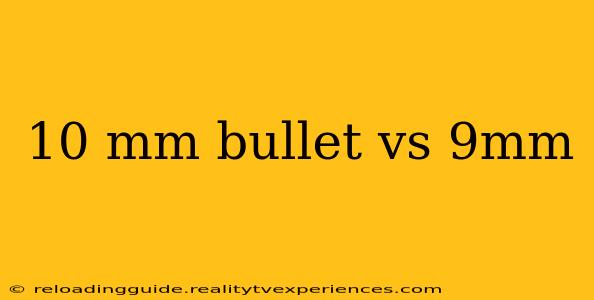Choosing the right caliber for self-defense or recreational shooting is a crucial decision. This in-depth comparison of the 10mm Auto and 9mm Parabellum cartridges will help you understand their key differences, advantages, and disadvantages to make an informed choice. We'll explore factors like ballistics, recoil, capacity, and suitability for various applications.
Ballistics: Power and Penetration
The most significant difference between the 10mm and 9mm lies in their ballistic performance. The 10mm Auto boasts significantly more stopping power due to its larger diameter and heavier bullet weight. This translates to greater energy transfer upon impact, potentially leading to more effective incapacitation of a target. Conversely, the 9mm, while less powerful, offers greater penetration in some instances, particularly with certain bullet designs.
-
10mm: Higher muzzle energy, flatter trajectory, greater stopping power, potentially less penetration in certain barriers. Ideal for larger game hunting or situations requiring maximum stopping power at longer ranges.
-
9mm: Lower muzzle energy, more readily available ammunition, higher capacity magazines, manageable recoil, greater penetration in some barrier tests. A popular choice for concealed carry and self-defense due to its balance of manageable recoil and effective stopping power.
Penetration: A Critical Consideration
While raw power is important, penetration is equally crucial. The effectiveness of a round depends not only on its initial energy but also its ability to penetrate clothing, barriers (like car doors or windshields), and still retain sufficient energy to incapacitate the target. Both calibers offer various bullet types (jacketed hollow point, full metal jacket, etc.) impacting penetration characteristics. Independent testing and analysis from reputable sources should be consulted for detailed penetration data across various materials.
Recoil and Shootability
The 10mm Auto's greater power results in significantly more recoil than the 9mm. This can make it more challenging for smaller-framed individuals or those new to firearms to manage effectively. The 9mm's lighter recoil allows for quicker follow-up shots and improved accuracy during rapid firing.
-
10mm: Higher recoil, potentially challenging for some shooters, requires more training and practice to master.
-
9mm: Lower recoil, easier to control, allows for faster target acquisition and more shots on target.
Magazine Capacity and Availability
Ammunition availability is a critical factor. 9mm ammunition is vastly more prevalent and generally more affordable than 10mm. Higher capacity magazines are also more readily available for the 9mm, a significant advantage for self-defense situations.
-
10mm: Lower ammunition availability, potentially higher cost, typically lower magazine capacity.
-
9mm: High ammunition availability, generally lower cost, higher capacity magazines readily available.
Applications: Self-Defense, Hunting, and Sport Shooting
The ideal caliber depends largely on the intended application.
-
Self-Defense: Both calibers are suitable for self-defense, but the 9mm's lower recoil and higher capacity often make it the preferred choice for concealed carry. The 10mm provides greater stopping power, but its recoil might hinder rapid shot placement under stress.
-
Hunting: The 10mm is more suitable for hunting larger game, offering superior stopping power. The 9mm is generally inadequate for larger animals.
-
Sport Shooting: Both calibers are popular for sport shooting, but the 9mm's lower recoil makes it a more comfortable choice for extended range sessions.
Conclusion: Choosing the Right Caliber
The "better" caliber depends entirely on individual needs and preferences. The 9mm offers a balance of manageable recoil, high capacity, and widespread availability, making it a popular choice for self-defense and sport shooting. The 10mm, while packing more power, demands more training and practice due to its significant recoil. Careful consideration of individual physical capabilities, intended use, and personal preferences is crucial in making an informed decision. Consulting with experienced firearms instructors and professionals is highly recommended.

